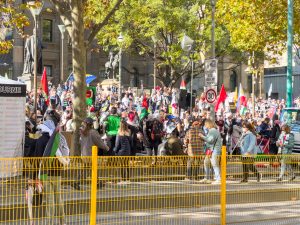With its attacks on Israel on October 7, 2023, Hamas had a two pillar strategy: first to encourage a brutal overreaction from Israel that would harm its international reputation and weaken its support from its allies, and second to create an intense wave of political and social schisms throughout the West. The goal was to make Israel and Palestine the only issue and have it eat away at the missions of every organization, whether directly related or not.
With both of these pillars, Hamas has been wildly successful.
The Australian government has essentially acknowledged this success by seeking to curtail its effects with the creation of three new special envoys. The first to be appointed was a special envoy to combat antisemitism, named earlier in July. Then Australian leaders signaled that they would appointed a special envoy to combat Islamophobia (candidates are still being considered), and in a recent Cabinet reshuffle Prime Minister Anthony Albanese appointed Member of Parliament (MP) Peter Khalil as the special envoy on social cohesion.
Having to create such positions is a certain admission of defeat. It is a demonstration that social conditions in the country have shifted and that civil society requires a government push to understand the implications of religious and ethnic hatred. For a country that has made an incredibly successful transition to a highly multicultural society over the past several decades, having to appoint people to such positions is troubling.
There has been a significant spike in racially and religiously motivated physical assaults, verbal abuse, death threats, vandalism of MP’s offices, businesses boycotted, and almost weekly protests over the last nearly 10 months. For a country whose broader population values stability above all else – and is usually incredibly peaceful – this escalation in public passions is a concern.
Hamas understood that the issue of Israel and Palestine hardens and entrenches political cleavages, as well as attaches itself to powerful concepts like decolonization. These positions are further inflamed by the often putrid silos of social media. The “choose a side” public discourse is contrary not only to liberal democratic principles, but also to the day-to-day functionality of multicultural harmony.
Of course, mass death and destruction is undeniably horrific and cannot help but disturb and anger people. Israel has walked into a trap laid by Hamas and the shift in the Australian government’s own response to the war is indicative of Canberra’s own weakening patience and tolerance for Israel’s actions. But to be appalled with violence and advocate for an end to hostilities is markedly distinct from abusing and attacking fellow Australians. The latter is, of course, often driven by ideological positions and psychological dispositions that have little to do with solutions to the problem at hand.
So as Australia creates these new special envoys to deal with current social conditions within the country, the question remains: What can they actually achieve? They may advocate for better processes for reporting hate crimes, with strong anti-vilification legislation to more forcefully criminalize these actions. They may also seek to create better public education campaigns.
Yet people who are driven by hate are often mired in a relentless and all-consuming cynicism toward the world. It is very difficult for governments to reach people who distrust official structures. Public education campaigns may serve to entrench people’s resentment, contrary to their aims.
With the creation of special envoys for antisemitism and Islamophobia the government may also inadvertently create competition between the envoys – a greater problem. Only if the two envoys are able to work intimately with each other – and see each other as working for the same cause – will their missions be effective. A starting point would be the recognition that despite what the current polarized social environment may indicate, both these forms of hate are often perpetuated by the same individuals.
For social cohesion to be genuine it shouldn’t need government intervention. It should exist in the realm of everyday norms and practices. Individual commitment to it should be implicit not explicit. To have to encourage it – to wave one’s arms around and draw attention to it – is a display of social insecurity. For the Australian government to have to resort to the creation of special envoys to combat hatred and promote social cohesion is an admission that this cohesion is faltering.
By global standards Australia is still a cohesive society. However, it is not immune to major shocks that can eat away at the success that its people have built. The problem is that these shocks keep materializing – whether they be the Israel/Hamas war, the COVID-19 pandemic, and Donald Trump as an influential disruptive figure – and each corrodes this cohesion a little more.

































